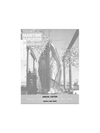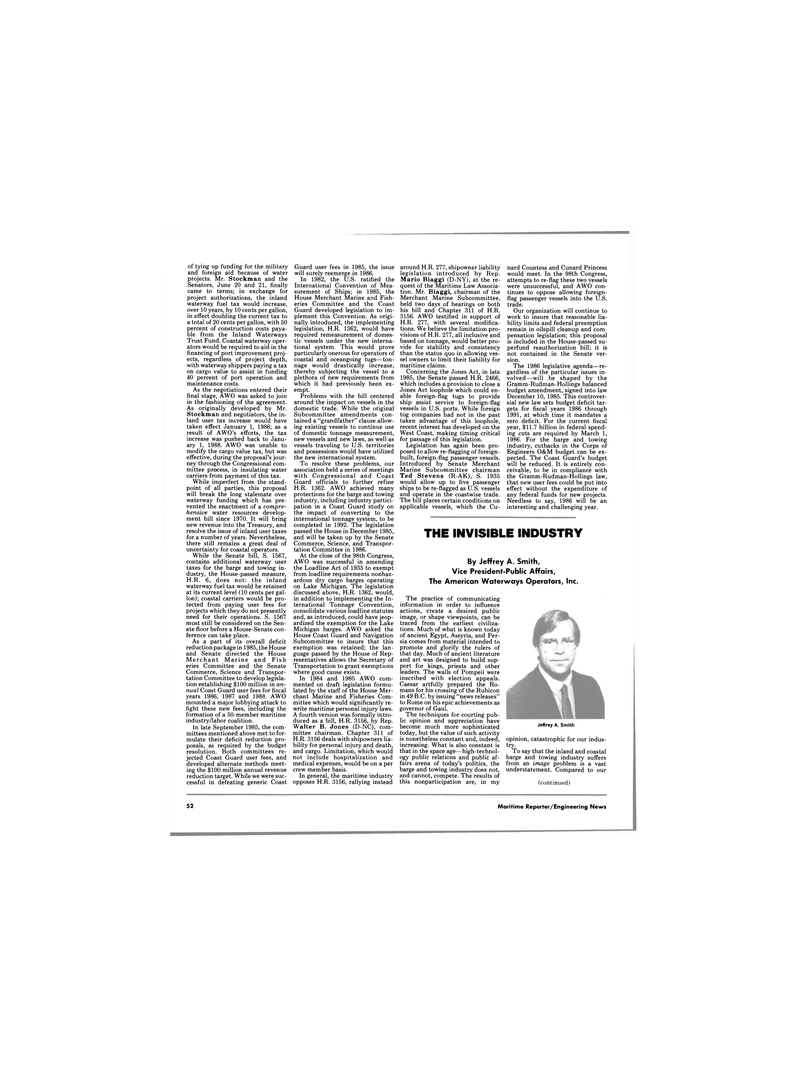
Page 50: of Maritime Reporter Magazine (March 1986)
Read this page in Pdf, Flash or Html5 edition of March 1986 Maritime Reporter Magazine
of tying up funding for the military and foreign aid because of water projects. Mr. Stockman and the
Senators, June 20 and 21, finally came to terms; in exchange for project authorizations, the inland waterway fuel tax would increase, over 10 years, by 10 cents per gallon, in effect doubling the current tax to a total of 20 cents per gallon, with 50 percent of construction costs paya- ble from the Inland Waterways
Trust Fund. Coastal waterway oper- ators would be required to aid in the financing of port improvement proj- ects, regardless of project depth, with waterway shippers paying a tax on cargo value to assist in funding 40 percent of port operation and maintenance costs.
As the negotiations entered their final stage, AWO was asked to join in the fashioning of the agreement.
As originally developed by Mr.
Stockman and negotiators, the in- land user tax increase would have taken effect January 1, 1986; as a result of AWO's efforts, the tax increase was pushed back to Janu- ary 1, 1988. AWO was unable to modify the cargo value tax, but was effective, during the proposal's jour- ney through the Congressional com- mittee process, in insulating water carriers from payment of this tax.
While imperfect from the stand- point of all parties, this proposal will break the long stalemate over waterway funding which has pre- vented the enactment of a compre- hensive water resources develop- ment bill since 1970. It will bring new revenue into the Treasury, and resolve the issue of inland user taxes for a number of years. Nevertheless, there still remains a great deal of uncertainty for coastal operators.
While the Senate bill, S. 1567, contains additional waterway user taxes for the barge and towing in- dustry, the House-passed measure,
H.R. 6, does not: the inland waterway fuel tax would be retained at its current level (10 cents per gal- lon); coastal carriers would be pro- tected from paying user fees for projects which they do not presently need for their operations. S. 1567 must still be considered on the Sen- ate floor before a House-Senate con- ference can take place.
As a part of its overall deficit reduction package in 1985, the House and Senate directed the House
Merchant Marine and Fish eries Committee and the Senate
Commerce, Science and Transpor- tation Committee to develop legisla- tion establishing $100 million in an- nual Coast Guard user fees for fiscal years 1986, 1987 and 1988. AWO mounted a major lobbying attack to fight these new fees, including the formation of a 50-member maritime industry/labor coalition.
In late September 1985, the com- mittees mentioned above met to for- mulate their deficit reduction pro- posals, as required by the budget resolution. Both committees re- jected Coast Guard user fees, and developed alternate methods meet- ing the $100 million annual revenue reduction target. While we were suc- cessful in defeating generic Coast
Guard user fees in 1985, the issue will surely reemerge in 1986.
In 1982, the U.S. ratified the
International Convention of Mea- surement of Ships; in 1985, the
House Merchant Marine and Fish- eries Committee and the Coast
Guard developed legislation to im- plement this Convention. As origi- nally introduced, the implementing legislation, H.R. 1362, would have required remeasurement of domes- tic vessels under the new interna- tional system. This would prove particularly onerous for operators of coastal and oceangoing tugs—ton- nage would drastically increase, thereby subjecting the vessel to a plethora of new requirements from which it had previously been ex- empt.
Problems with the bill centered around the impact on vessels in the domestic trade. While the original
Subcommittee amendments con- tained a "grandfather" clause allow- ing existing vessels to continue use of domestic tonnage measurement, new vessels and new laws, as well as vessels traveling to U.S. territories and possessions would have utilized the new international system.
To resolve these problems, our association held a series of meetings with Congressional and Coast
Guard officials to further refine
H.R. 1362. AWO achieved many protections for the barge and towing industry, including industry partici- pation in a Coast Guard study on the impact of converting to the international tonnage system, to be completed in 1992. The legislation passed the House in December 1985, and will be taken up by the Senate
Commerce, Science, and Transpor- tation Committee in 1986.
At the close of the 98th Congress,
AWO was successful in amending the Loadline Act of 1935 to exempt from loadline requirements nonhaz- ardous dry cargo barges operating on Lake Michigan. The legislation discussed above, H.R. 1362, would, in addition to implementing the In- ternational Tonnage Convention, consolidate various loadline statutes and, as introduced, could have jeop- ardized the exemption for the Lake
Michigan barges. AWO asked the
House Coast Guard and Navigation
Subcommittee to insure that this exemption was retained; the lan- guage passed by the House of Rep- resentatives allows the Secretary of
Transportation to grant exemptions where good cause exists.
In 1984 and 1985 AWO com- mented on draft legislation formu- lated by the staff of the House Mer- chant Marine and Fisheries Com- mittee which would significantly re- write maritime personal injury laws.
A fourth version was formally intro- duced as a bill, H.R. 3156, by Rep.
Walter B. Jones (D-NC), com- mittee chairman. Chapter 311 of
H.R. 3156 deals with shipowners lia- bility for personal injury and death, and cargo. Limitation, which would not include hospitalization and medical expenses, would be on a per crew member basis.
In general, the maritime industry opposes H.R. 3156, rallying instead around H.R. 277, shipowner liability legislation introduced by Rep.
Mario Biaggi (D-NY), at the re- quest of the Maritime Law Associa- tion. Mr. Biaggi, chairman of the
Merchant Marine Subcommittee, held two days of hearings on both his bill and Chapter 311 of H.R. 3156. AWO testified in support of
H.R. 277, with several modifica- tions. We believe the limitation pro- visions of H.R. 277, all inclusive and based on tonnage, would better pro- vide for stability and consistency than the status quo in allowing ves- sel owners to limit their liability for maritime claims.
Concerning the Jones Act, in late 1985, the Senate passed H.R. 2466, which includes a provision to close a
Jones Act loophole which could en- able foreign-flag tugs to provide ship assist service to foreign-flag vessels in U.S. ports. While foreign tug companies had not in the past taken advantage of this loophole, recent interest has developed on the
West Coast, making timing critical for passage of this legislation.
Legislation has again been pro- posed to allow re-flagging of foreign- built, foreign-flag passenger vessels.
Introduced by Senate Merchant
Marine Subcommittee chairman
Ted Stevens (R-AK), S. 1935 would allow up to five passenger ships to be re-flagged as U.S. vessels and operate in the coastwise trade.
The bill places certain conditions on applicable vessels, which the Cu-
The practice of communicating information in order to influence actions, create a desired public image, or shape viewpoints, can be traced from the earliest civiliza- tions. Much of what is known today of ancient Egypt, Assyria, and Per- sia comes from material intended to promote and glorify the rulers of that day. Much of ancient literature and art was designed to build sup- port for kings, priests and other leaders. The walls of Pompeii were inscribed with election appeals.
Caesar artfully prepared the Ro- mans for his crossing of the Rubicon in 49 B.C. by issuing "news releases" to Rome on his epic achievements as governor of Gaul.
The techniques for courting pub- lic opinion and appreciation have become much more sophisticated today, but the value of such activity is nonetheless constant and, indeed, increasing. What is also constant is that in the space age—high-technol- ogy public relations and public af- fairs arena of today's politics, the barge and towing industry does not, and cannot, compete. The results of this nonparticipation are, in my nard Countess and Cunard Princess would meet. In the 98th Congress, attempts to re-flag these two vessels were unsuccessful, and AWO con- tinues to oppose allowing foreign- flag passenger vessels into the U.S. trade.
Our organization will continue to work to insure that reasonable lia- bility limits and federal preemption remain in oilspill cleanup and com- pensation legislation; this proposal is included in the House-passed su- perfund reauthorization bill; it is not contained in the Senate ver- sion.
The 1986 legislative agenda—re- gardless of the particular issues in- volved—will be shaped by the
Gramm-Rudman-Hollings balanced budget amendment, signed into law
December 10, 1985. This controver- sial new law sets budget deficit tar- gets for fiscal years 1986 through 1991, at which time it mandates a zero deficit. For the current fiscal year, $11.7 billion in federal spend- ing cuts are required by March 1, 1986. For the barge and towing industry, cutbacks in the Corps of
Engineers O&M budget can be ex- pected. The Coast Guard's budget will be reduced. It is entirely con- ceivable, to be in compliance with the Gramm-Rudman-Hollings law, that new user fees could be put into effect without the expenditure of any federal funds for new projects.
Needless to say, 1986 will be an interesting and challenging year.
Jeffrey A. Smith opinion, catastrophic for our indus- try.
To say that the inland and coastal barge and towing industry suffers from an image problem is a vast understatement. Compared to our (continued)
THE INVISIBLE INDUSTRY
By Jeffrey A. Smith,
Vice President-Public Affairs,
The American Waterways Operators, Inc. 52 Maritime Reporter/Engineering News

 49
49

 51
51
